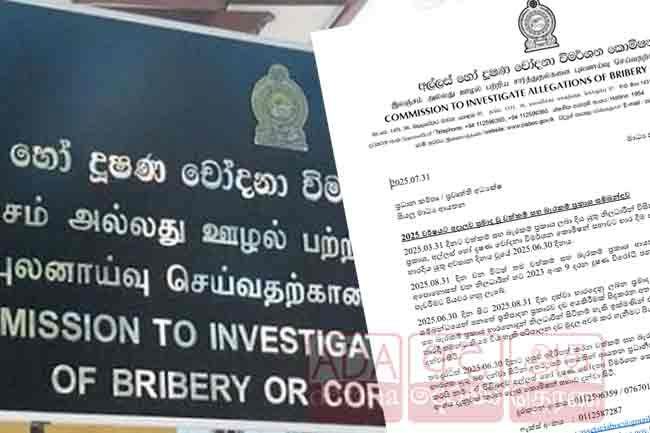
Top Officials Face Fines, Jail for the failure of Asset Declarations to CIABOC
- CNL Reporter
- August 4, 2025
- Political
- CIABOC
- 0 Comments
News of the Day
The Commission to Investigate Allegations of Bribery or Corruption (CIABOC) has issued a final warning to all Executive Grade State officials who have failed to submit their annual declarations of assets and liabilities for 2025.
According to the Commission, legal action under the Anti-Corruption Act No. 9 of 2023 will be taken against officials who do not meet the final deadline of 31 August 2025.
The declarations, which should have been filed by 31 March 2025 and submitted to institutional heads by 30 June, are now subject to daily financial penalties for non-compliance.
A grace period that allowed late submissions up to 31 August will now result in mounting fines, and CIABOC emphasized that failure to comply by 1 September will be considered a punishable offence.
Under the new law, daily fines for delayed submissions are directly deducted from salaries. From 1 to 31 July, the penalty is one-thirtieth of an official’s gross monthly salary. From 1 to 31 August, the fine increases to one-thirtieth of the average salary over the past six months.
Beyond financial penalties, the Commission has also warned of criminal consequences for total non-compliance. According to Section 90(5) of the Act, failure to file declarations by 1 September is an offence that may result in a fine equivalent to 12 months’ salary, up to one year in prison, or both—if convicted following investigation.
The Anti-Corruption Act No. 9 of 2023, which came into force on 15 September 2023, significantly broadens the scope of officials required to file declarations. This now includes the President, Provincial Governors, officers of public corporations and councils, heads of diplomatic missions, military staff officers, and even office bearers of national sports bodies and private companies with more than 25% state ownership.
Private staff of MPs, local council members, and media company management also fall under the mandate. Though no official total has been publicly disclosed, sources estimate the number of eligible individuals to be between 25,000 and 30,000.
Despite the widening net, CIABOC says compliance has improved significantly this year, helped by the launch of a digital declaration system. A downloadable format has been introduced for 2025 filings, and a full-scale e-declaration platform is in development with assistance from the United Nations Development Programme (UNDP) and the Asian Development Bank (ADB).
The Commission urges all delinquent officials to submit their declarations immediately to avoid fines and prosecution. Heads of institutions are required to accept late submissions and report any refusals to CIABOC.
With Sri Lanka pushing for greater accountability, this marks a crucial step in the country’s anti-corruption campaign under its latest legal framework.

